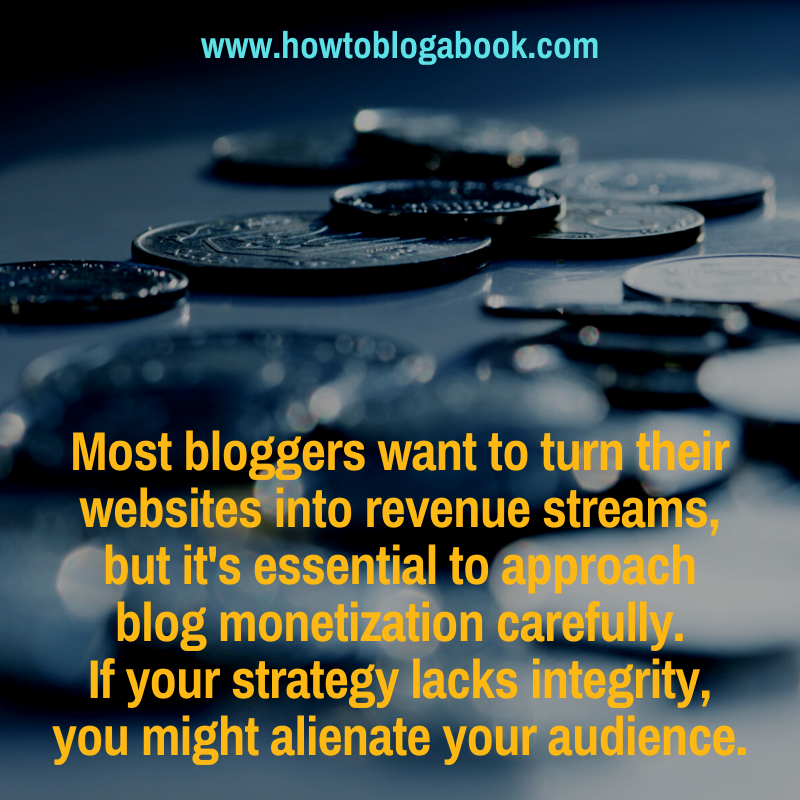Most bloggers and authors want to turn their websites into revenue streams. However, if you don’t approach blog monetization carefully and with a sound strategy, you risk alienating your audience. And it’s hard to make money—let alone a difference—with your blog content if you have no readers.
I see the same monetization mistakes again and again in the travel niche. New bloggers launch a site and fill their sidebars and posts with pay-per-click ads rather than a foundation of good quality content. It’s immediately evident to a visitor that the blogger is focused on making money rather than providing value. As a result, these sites look spammy and feel yucky because they focus on taking rather than giving.
There’s nothing wrong with wanting to make money with your blog, but approach monetization in a way that allows you to maintain your integrity. Do this by primarily focusing on giving your audience what they need and want before you start trying to make money off them.
Monetizing your site is a multi-step process and needs to be viewed as a long-term strategy, not a get-rich-quick scheme. The foundation for monetization relies on your knowledge of what your audience needs and their trust in you and what you write.
What Does Your Audience Need?
 Every industry has its pain points, trends, and news. By keeping your finger on the pulse of your niche, you’ll recognize recurring themes as well as new issues. You can read trade journals, visit online forums, or join Facebook communities to see what challenges people face. Then create content that offers a solution based on your first-hand experience.
Every industry has its pain points, trends, and news. By keeping your finger on the pulse of your niche, you’ll recognize recurring themes as well as new issues. You can read trade journals, visit online forums, or join Facebook communities to see what challenges people face. Then create content that offers a solution based on your first-hand experience.
Also, check your visitor stats to monitor which search terms people are using to find your site. And keep an eye on your most popular articles. These indicate what topics resonate most with your audience right now and over time.
For instance, on my self-publishing site, I checked my stats. I noticed that Amazon Expanded Distribution was creating a lot of inbound activity. So I created more posts using the same keyword.
How to Gain your Audiences’ Trust
I’d written one post about how I’d chosen the Amazon Expanded Distribution option for my nonfiction book and then regretted the decision. I created a series of articles about the process required to remove it from expanded distribution and make my book available on Ingram Spark.
I wrote about my first-hand knowledge and experience and included explanations and how-to steps to support other authors in the same situation. Sharing these personal experiences, both good and bad, helps gain your audiences’ trust. When you’ve trodden the path ahead of them, they’re more likely to follow your footsteps—and your blog.
Sound Blog Monetization Strategies to Implement
Once you’re consistently writing content focused on what your audience needs and you’ve built a foundation of trust, you can start exploring monetizing your site. Here are a few strategies to consider.
Paid Back Links
Easy to do—Bad for Integrity
I get daily requests from writers who want to place guest blog posts containing paid links on my established websites. These “backlinks” help create authority for the destination site, but I turn all of these down. The links would lead to websites not related to my niche.
Of course, it would be easy to publish the post and take the money. But if my audience clicks on a link and it leads, for example, to a gambling website with lots of pop-up ads, they’re not going to trust any of the other links I include on my site. Ultimately, they may end up avoiding my site altogether. The easy money I’d get for these backlinks could severely damage my reputation and blog success, making this monetization strategy not worth pursuing.
Buying backlinks is a way of misleading search engines, like Google, into believing the destination website has a higher reputation than it really does. If you’re going to include backlinks on your site, they need to be relevant to your niche. You also to feel confident about the outbound links you’re featuring.
An effective SEO strategy uses organic outbound links to show site authority, but paid backlinks are considered a Black Hat SEO activity. Paid backlinks on your site could end up having a negative impact on your website and integrity. Plus, sites featuring too many paid backlinks open themselves up to penalties by Google. That’s not a road you want to go down.
Affiliate Links
Easy to Do—Good for Integrity
You can add outbound links to reputable sources, services, or tools you’ve used and believe in. On my self-publishing blog, I recommend products, software, and services I’ve used. Some of these include affiliate links, which means I’m a member of the company’s affiliate program.
If a reader clicks on one of my affiliate links, they are taken to the company’s website. As a result of using my link, I get a percentage of the sale price if that reader makes a purchase. In effect, the company is paying me a small sales commission for referring people to their product or service. My recommendation helps my audience with their decision-making process, and it doesn’t cost them anything.
You help your blog audience each time you recommend the tools and services you’ve used that have helped you. Yes, you’re also creating an opportunity to make money, but, at the same time, you’re focusing on making your audience’s life easier, not making money on them.
This means your monetization activity is steeped in integrity. Promoting courses, tools, books, and consulting services you stand behind adds to your subject matter expertise status. It shows you have your finger on the pulse of your industry. Your audience has confidence in your recommendations because you’re giving the products or services your seal of approval.
To choose affiliate programs, look at the products and services you’re already using. Then if the company has an affiliate program.
It’s essential (even a legal requirement in some countries, like the U.S.) to disclose to your audience that some of your links are affiliate links. You can do this at the start or end of your posts. Or include the notification on a separate page, such as the one that provides your terms and privacy notices.
Become an Amazon Affiliate
An excellent first entry into the affiliate arena is via Amazon. They sell such a broad range of products and books it will be easy to find one you’d be comfortable recommending.
Here’s another benefit of using the Amazon Affiliate program: If one of your readers uses your Amazon affiliate link for a specific product, arrives on Amazon.com, and purchases a totally different product, you still earn a commission for that sale.
I’ve earned affiliate income on random high-ticket item purchases. One of my site visitors must have clicked on a book link—got distracted when they arrived on Amazon—and ended up buying a chain-saw.
Create Affiliate Links Organically
The Amazon affiliate links—or any other affiliate links you use—must be incorporated organically into your website. This ensures they support your quality content and don’t become the main feature. Here are three examples of ways you can accomplish this:
Write a book review post—Read a book in your niche, and then write a post about one aspect of the book. Reference your key takeaways or learnings. Then, at the bottom of the page, add a picture of the book that contains an Amazon affiliate link. You also can include an affiliate link upon first mention of the book.
Feature other authors—I feature an author interview series on my self-publishing blog. The interviews provide tips and advice about how these indie authors wrote, self-published, and marketed their books, using their most recent books as an example. These posts help the author by showcasing their books. The Amazon affiliate links I include can provide me with a small income…if my readers purchase the featured book.
The primary reason I host this author interview series is to motivate and help other writers become authors. The little bit of income is just icing on the cake, so I remain in integrity.
Share your experience—After you sign up and get approved for the company’s affiliate program, write a post that shares your experience with its product or service or the tips and tricks you’ve learned with it. Use your affiliate link upon first mention of the product as well as in any images of the product you might include.
For example. I’m an affiliate for the writing program Scrivener. I’ve used it for years and wouldn’t be without it. Although its primary use is for writing books, I think it’s versatile enough to be used by bloggers. Many of my posts feature tips and advice about how bloggers can use Scrivener to organize and manage their blog articles, guest post pitches, and blogging a book content. Each of these includes an affiliate link to the Scrivener product, which is sold by the company Literature and Latte.
Create Your Own Products
Labor-Intensive to Do—Good for Integrity
As well as promoting other people’s affiliate products, you can create and sell your own products or offer coaching or done-for-you services. If you haven’t established expertise in your field or trust with your audience, you’re probably not going to earn much income from this revenue stream.
However, with a collection of valuable content on your blog, the obvious next step is to create products based on your knowledge. Then, make them available on your site and promote them via your blog.
For instance, you can:
- Blog a book and sell it directly from your website or include an affiliate link to buy it on Amazon.
- Create an online course and host it yourself or feature it on an online learning site like Udemy, which helps market it for you.
- Offer coaching in your area of expertise.
Nonfiction authors often use this monetization strategy and become authorpreneurs. They build a business around their books. This is a powerful way to also build a business around your blog.
Give Your Audience What It Wants and Needs
These strategies all allow you to take what you know, produce valuable content in the form of blog posts, and, in the end, make money. And, except for paid backlinks, each one keeps your focus on giving your audience what they need and want in the format they find accessible and useful.
While it sounds counterintuitive, monetizing your blog shouldn’t be about what’s in it for you. To succeed, your strategy needs to be about what’s in it for your audience. How can what you’re promoting and selling help readers achieve their goals? When you approach monetization from this perspective, you build trust and maintain your integrity.
What monetization approach have you found to be effective? Tell us in a comment below, and please share this post with other bloggers and writers.
About the Author

Jay Artale abandoned her corporate career to become a digital nomad and full-time writer. She’s an avid blogger and a nonfiction author helping travel writers and travel bloggers achieve their self-publishing goals. Join her at Birds of a Feather Press where she shares tips, advice, and inspiration to writers with an independent spirit.


Thanks for the nice post.
Hey, Well Your content article was very unique and important for us.